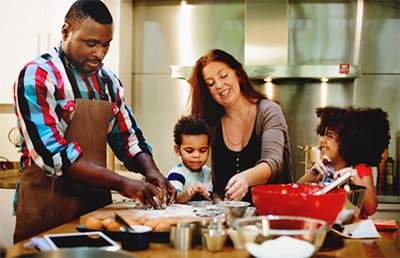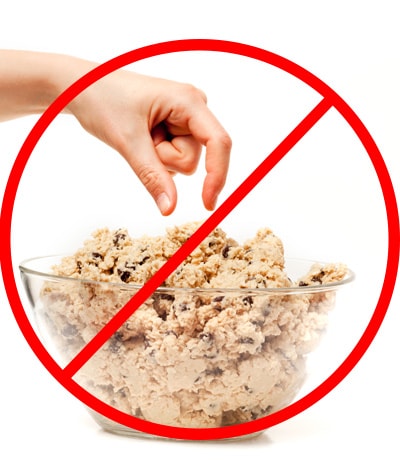Say No to Raw Dough
Spending time with family and friends while preparing delicious baked foods in the kitchen is a great way to celebrate special occasions. Follow these safety tips to help you stay healthy when handling raw dough.
When you prepare homemade dough for cookies, cakes, and bread, you may be tempted to taste a bite before it is fully baked. But steer clear of this temptation—you can get sick after eating or tasting unbaked products that are intended to be baked, such as dough or batter. Children can get sick from handling or eating raw dough used for crafts or play clay, too.

Raw Dough Can Contain Bacteria That Cause Disease
Flour doesn’t look like a raw food, but typically it is. This means it hasn’t been treated to kill germs such as Escherichia coli (E. coli), which causes food poisoning (foodborne illness). Harmful germs can contaminate grain while it’s still in the field or at other steps during flour production. Processing steps like grinding grain and bleaching flour do not kill germs like E. coli.
Bacteria are killed only when food made with flour is cooked. This is why you should never taste or eat raw dough or batter—whether made from recalled flour or any other flour.
In recent years (2016 and 2019), two outbreaks of E. coli infections linked to raw flour made more than 80 people sick. Flour and baking mixes that contain flour have long shelf lives, so it’s a good idea to check your pantry to see if you have any flour or baking mixes that have been recalled in recent years. If you have any recalled flour or baking mixes, throw them away.
Raw eggs are another ingredient in uncooked batter and dough that can make you sick. Raw or lightly cooked eggs can contain Salmonella, a germ that causes food poisoning. Eggs are safe to eat when cooked and handled properly.
Some companies and stores offer edible cookie dough that uses heat-treated flour and pasteurized eggs or no eggs. Read the label carefully to make sure the dough is meant to be eaten without baking or cooking.

Eating uncooked flour or raw eggs can make you sick. Don’t taste or eat raw dough or batter!
Follow safe food handling practices when you are baking and cooking with flour and other raw ingredients:
- Do not taste or eat any raw dough or batter, whether for cookies, tortillas, pizza, biscuits, pancakes, or crafts made with raw flour, such as homemade play dough or holiday ornaments.
- Do not let children play with or eat raw dough, including dough for crafts.
- Bake or cook raw dough and batter, such as cookie dough and cake mix, before eating.
- Follow the recipe or package directions for cooking or baking at the proper temperature and for the specified time.
- Do not make milkshakes with products that contain raw flour, such as cake mix.
- Do not use raw homemade cookie dough in ice cream.
- Cookie dough ice cream sold in stores contains dough that has been treated to kill harmful bacteria.
- Keep raw foods such as flour or eggs separate from ready-to-eat foods. Because flour is a powder, it can spread easily.
- Follow label directions to refrigerate products containing raw dough or eggs until they are cooked.
- Clean up thoroughly after handling flour, eggs, or raw dough:
- Wash your hands with running water and soap after handling flour, raw eggs, or any surfaces they have touched.
- Wash bowls, utensils, countertops, and other surfaces with warm, soapy water.
Pay Close Attention to Any Symptoms
Food poisoning symptoms may range from mild to severe and may differ depending on the germ you swallowed.
The symptoms of E. coli infections vary but often include severe stomach cramps, diarrhea (often bloody), and vomiting. People usually get sick 3 to 4 days after swallowing the germ. Most people recover within a week. However, some people develop a serious type of illness called hemolytic uremic syndrome (HUS), which can result in kidney failure, stroke, and even death.
The symptoms of Salmonella infections typically appear 6 hours to 6 days after eating a contaminated food. Symptoms typically include diarrhea, fever, and stomach cramps. In most cases, illness lasts 4 to 7 days and people recover without antibiotics. Illness from Salmonella bacteria can be serious and is more dangerous for adults age 65 and older, infants, and people who have health problems or take medicines that lower the body’s ability to fight germs and sickness.


































No hay comentarios:
Publicar un comentario